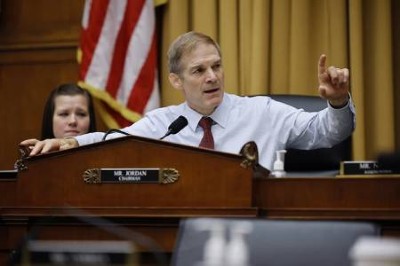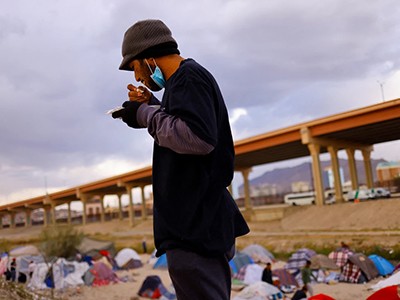When I travelled to Iraq earlier this year, I witnessed what some might call a dystopian future. In blistering 50 °C heat in Basra, it was clear that climate change is our here and now. As United Nations secretary-general António Guterres said in July, the era of ‘global boiling’ has well and truly commenced.
We are catapulting towards an unrecognizable world — 3°C hotter than the pre-industrial one and filled with widespread pollution by the end of the century. This crisis will be an insurmountable threat to humanity’s future, unless we take immediate and colossal steps to address it.
As the United Nations high commissioner for human rights, I believe that science and human rights must direct humanity’s actions. As the world marks 75 years of the Universal Declaration of Human Rights, we must all remember that human rights exist to empower people, protect their lives and dignity, and curb humanity’s worst impulses.
Disinformation researchers under investigation: what’s happening and why
In 1948, in the wake of two world wars and the Great Depression, world leaders gathered to adopt the Universal Declaration. Science is a part of it: article 27 declares that “everyone has the right … to share in scientific advancement and its benefits”. And never has that right been so crucial, or in such danger.
Global action and inaction, fuelled by failures of policymakers and businesses, and worsened by greed, ideology and indifference, are propelling us ever deeper into environmental catastrophe. Addressing the crisis is possible only through open debate, critical thinking and evidence-based analysis. Yet we still see heavy corporate influence on regulatory processes, direct attacks on scientific studies, smear campaigns against scientists, misleading literature and exploitation of scientific illiteracy.
Too many governments, policymakers and big-industry leaders are wilfully shutting their eyes to science and deploying biased ‘experts’ to sow doubt and undermine scientific facts. For example, environmental scientist Geoffrey Supran and historian Naomi Oreskes at Harvard University in Cambridge, Massachusetts, have shown how the fossil-fuel industry funded counter research and climate-change-denial campaigns after internal scientists sounded the alarm on the risks of fossil-fuel emissions (G. Supran & N. Oreskes One Earth 4, 696–719; 2021). Other big industries have also suffocated evidence, on the harms of everything from pesticide use to lead additives, at the expense of people’s right to health.
What scientists need to do to accelerate progress on the SDGs
Under the human right to a clean, healthy and sustainable environment for all, recognized by the UN General Assembly last year, polluters must be held to account. Scientists have provided powerful tools for doing so.
The UN Intergovernmental Panel on Climate Change and the Intergovernmental Science-Policy Platform on Biodiversity and Ecosystem Services have delivered eye-opening assessments and found that rights-based approaches are integral to better policy outcomes. Human-rights guardrails must be integrated into policymaking, investment decisions and business models.
The UN’s Committee on Economic, Social and Cultural Rights stipulates that industry and governments must make every effort possible to promote accurate scientific information. This means no more disinformation, no more disparagement and no more deliberately misinforming the public to erode understanding and respect for science.
Following the six steps I outline below can ensure that the human right to benefit from science and its applications catalyses the advancement of all human rights.
First, scientific enquiry needs an enabling environment. Scientists who expose the negative impacts of human action on human health and the planet — as well as environmental human-rights defenders — must be protected from attacks, threats, smear campaigns and harassment.
Proposed law could protect academic freedom across Europe
Second, society must protect scientific enquiry from conflicts of interest. Any individual tasked with developing or overseeing the implementation of public-health or environmental policy must disclose all commercial and institutional ties; this should be monitored independently and enforced through conflict-of-interest laws.
Third, governments should fund climate-change research at the level that the truly existential threat deserves.
Fourth, a diverse range of voices must be involved in informing climate and environmental policy. These include people who have been historically marginalized and denied the right to benefit from science, including women, children, Indigenous peoples, people of African descent, people with disabilities and people living in poverty.
Fifth, education is crucial. Knowledge allows people and communities to exercise their agency, to protect the environment now and in future.
And sixth, societies must ensure equitable access to sustainable technologies. International cooperation on technology transfer, mobilization of resources and sharing of scientific knowledge are essential to address deep disparities between countries and ensure that all people have a clean, healthy and sustainable environment.
Human rights are not simply laws or an ideology — they are the key to survival of our species. By taking them seriously — as intended by the Universal Declaration 75 years ago — we can transform our current trajectory to safeguard the well-being of our planet for us and future generations.


 Disinformation researchers under investigation: what’s happening and why
Disinformation researchers under investigation: what’s happening and why
 Proposed law could protect academic freedom across Europe
Proposed law could protect academic freedom across Europe
 Thousands protest Mexico’s new science law
Thousands protest Mexico’s new science law
 World recommits to 2030 plan to save humanity — despite falling short so far
World recommits to 2030 plan to save humanity — despite falling short so far
 What scientists need to do to accelerate progress on the SDGs
What scientists need to do to accelerate progress on the SDGs
 How much progress are we making on the world’s biggest problems? Take this quiz on plans to save humanity
How much progress are we making on the world’s biggest problems? Take this quiz on plans to save humanity







